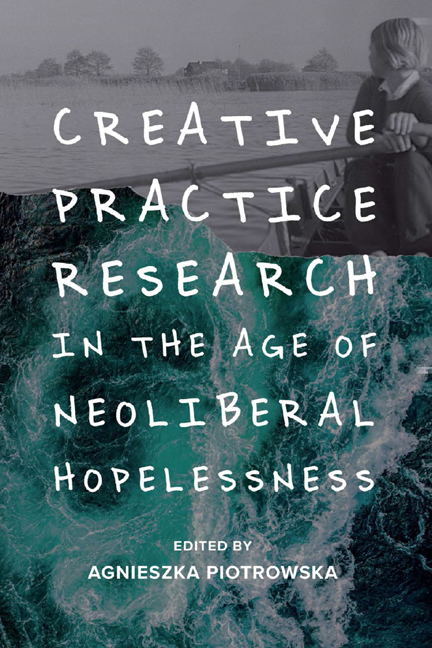Book contents
- Frontmatter
- Contents
- List of Figures
- Notes on Contributors
- Acknowledgements
- Preface: Life in the Post Pandemic Age
- Dedication
- 1 Introduction: Complexities, Compromises and Complicities
- 2 Against the Grain: Women Film Practitioners and Theorists Talk Creative Practice and Theory
- 3 Married to the Eiffel Tower: Notes on Love, Loss and Knowledge
- 4 Creativity and Neoliberalism: Between Autonomy, Resistance and Tactical Compliance
- 5 Tactical Compliance and the Persistence of Elsaesser
- 6 Storytelling and Game Playing
- 7 Autonomy and the Other Woman: Queer Active Agency and Postcolonial Expectations
- 8 From Neolithic to Neoliberal
- 9 First-person Expression on ‘Non-Western’ Screens: China as a Case Study
- 10 Scholarly Exploration of the Creative Process: Integrating Film Theory and Practice
- 11 Teaching Practice as Theory: Guerrilla Filmmaking
- 12 Baits of Falsehood: The Role of Fiction in Documentary or From Untheorised Practice to Unpractised Theory
- 13 Repented: A Creative Intersemiotic Translation
- Notes on Repented
- 14 How do you see me? The Camera as Transitional Object in Diasporic, Domestic Ethnography
- 15 ‘Shut Your Hole, Girlie. Mine's Making Money, Doll’: Creative Practice-Research and the Problem of Professionalism
- 16 Feminist ‘Pensive-creative Praxis’ and Irigaray: A Porous, Dialogical Encounter
- 17 The Paths of Creation, or How Can I Help my Dybbouk to Get Out of Me?
- 18 ‘We Want to Kill Boko Haram’: Reflections on the Photographic Representation of Children in a Displacement Camp
- 19 Between ‘Counter-movement’ (Ingold) and ‘Living with Ghosts’ (Demos)
- 20 Screen Memories: A Video Essay on Smultronstället/Wild Strawberries
- Index
7 - Autonomy and the Other Woman: Queer Active Agency and Postcolonial Expectations
Published online by Cambridge University Press: 17 October 2020
- Frontmatter
- Contents
- List of Figures
- Notes on Contributors
- Acknowledgements
- Preface: Life in the Post Pandemic Age
- Dedication
- 1 Introduction: Complexities, Compromises and Complicities
- 2 Against the Grain: Women Film Practitioners and Theorists Talk Creative Practice and Theory
- 3 Married to the Eiffel Tower: Notes on Love, Loss and Knowledge
- 4 Creativity and Neoliberalism: Between Autonomy, Resistance and Tactical Compliance
- 5 Tactical Compliance and the Persistence of Elsaesser
- 6 Storytelling and Game Playing
- 7 Autonomy and the Other Woman: Queer Active Agency and Postcolonial Expectations
- 8 From Neolithic to Neoliberal
- 9 First-person Expression on ‘Non-Western’ Screens: China as a Case Study
- 10 Scholarly Exploration of the Creative Process: Integrating Film Theory and Practice
- 11 Teaching Practice as Theory: Guerrilla Filmmaking
- 12 Baits of Falsehood: The Role of Fiction in Documentary or From Untheorised Practice to Unpractised Theory
- 13 Repented: A Creative Intersemiotic Translation
- Notes on Repented
- 14 How do you see me? The Camera as Transitional Object in Diasporic, Domestic Ethnography
- 15 ‘Shut Your Hole, Girlie. Mine's Making Money, Doll’: Creative Practice-Research and the Problem of Professionalism
- 16 Feminist ‘Pensive-creative Praxis’ and Irigaray: A Porous, Dialogical Encounter
- 17 The Paths of Creation, or How Can I Help my Dybbouk to Get Out of Me?
- 18 ‘We Want to Kill Boko Haram’: Reflections on the Photographic Representation of Children in a Displacement Camp
- 19 Between ‘Counter-movement’ (Ingold) and ‘Living with Ghosts’ (Demos)
- 20 Screen Memories: A Video Essay on Smultronstället/Wild Strawberries
- Index
Summary
Deconstructing Zoe is a British documentary film about transgender actor Zoe/Chowee Leow (2016), directed by Chinese British filmmaker, Rosa Fong. Written together with British film scholar Jenny Barrett, the following chapter is presented as a self-conscious reflection upon the practices of documentary filmmaking and the critical analysis of the film's subject from our different perspectives. It draws attention to a particular dilemma that arises in the enabling of a ‘voice’ to Zoe, a form of ethnographic statement in which she declares her transgender status and her racialised performance, and in the mediation of both the documentary format and the academic essay. The chapter is divided into two sections which indicate the author and help to create a negotiation of reflective practice and criticism. In the process, taking the lead from scholars Mohan J. Dutta and Ambar Basu in their autoethnographic study of subalternity and neoliberalism (2018), we explore and interrogate our own positions of privilege and autonomy in a neoliberal environment.
From a theoretical approach, Rosa seeks to articulate Zoe's ‘unfixing’ of her identity, creating what Homi Bhabha (1994) refers to as a ‘double consciousness’ of the colonised mind, not simply in Zoe's identity as a woman, but in her performed identity as a Chinese woman, the ‘Other’ woman, in her stage performances, in the documentary and in everyday life. First, by observing Dorinne K. Kondo's 1990 analysis of David Henry Hwang's play, M. Butterfly (1988), we can recognise Zoe's dissolving of the boundaries of both gender and race in an elected identity that can be understood as self-authored.
Then, by comparison with the Chilean artist, Pedro Lemebel, Jenny presents Zoe as the author of a marginalised identity that, in this case, evokes a pro-colonial discourse and yet is unmistakably subversive. The documentary allows Zoe's ‘voice’, as subaltern, to be heard, within which she theorises her own identity, and in this we hear the voice of both Self and Other, an endeavour that a postcolonial worldview would have good cause to celebrate. However, whilst Zoe's Orientalist performance destabilises Eurocentric authority and essentialism, and is thus a postcolonial activity, her racialised identity is pro-colonial, and so resists a postcolonial worldview. Ironically, if Zoe is understood as subaltern, postcolonial thought would celebrate her autonomy and self-authorship, and so would defend her right to author her own ethnography.
- Type
- Chapter
- Information
- Publisher: Edinburgh University PressPrint publication year: 2020



